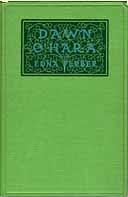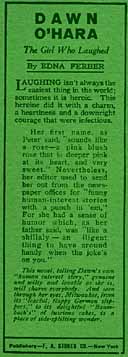

 |
 |
 Edna as a child |
Edna Ferber was born in Appleton, Wisconsin. Her home was a humble one, but was able to provide her with the opportunity for high school education and a very little work in Lawrence College. After graduating from high school, she did work for the Appleton Crescent in the capacity of news collector and reporter. Through this work she began to realize her powers and at the same time she trained herself to that keen observation of character which constitutes one of the greatest pleasures in her work. Appleton's stores, hotels, newspapers, and working life in general became her laboratory in which to study the characteristics, defects, and aspirations of human life as she finds it. As she has achieved greater success in her writing she has widened her sphere of acquaintanceship and of helpfulness. Her Emma McChesney is one of the cheeriest, truest, and most helpful characters given to American readers in recent years, and her latest book, "Fanny Herself" (1917), met a very kind reception. "Dawn O'Hara" was based upon her journalistic experience in Milwaukee. Miss Ferber's present home is in Chicago. |
 Edna as a young woman |
 |
WRITING UNDER DIFFICULTIES
"DAWN O'HARA, THE GIRL WHO LAUGHED," by Edna Ferber. Published
by permission of Frederick A. Stokes Co. Pages 40-43 and 50-53.
It's hard trying to develop into a real Writer Lady in the bosom of one's family, especially when the family refuses to take one seriously. Seven years of newspaper grind have taught me the fallacy of trying to write by the inspiration method. But there is such a thing as a train of thought, and mine is constantly being derailed, and wrecked and pitched about. Scarcely am I settled in my cubbyhole, typewriter before me, the working plan of a story buzzing about in my brain, when I hear my name called in muffled tones, as though the speaker were laboring with a mouthful of hairpins. I pay no attention. I have just given my heroine a pair of calm gray eyes, shaded with black lashes and hair to match. A voice floats down from the upstairs regions: "Dawn! Oh, Dawn! Just run and rescue the cucumbers out of the top of the ice-box, will you? The iceman's coming, and he'll squash 'em." A parting jab at my heroine's hair and eyes, and I'm off to save the cucumbers. Back at my typewriter once more. Shall I make my heroine petite or grande? I decide that stateliness and Gibsonesque height should accompany the calm gray eyes. I rattle away happily, the plot unfolding itself in some mysterious way. Sis opens the door a little and peers in. She is dressed for the street. "Dawn, dear, I'm going to the dressmaker's. Frieda's upstairs cleaning the bathroom, so take a little squint at the roast now and then, will you? See that it doesn't burn, and that there's plenty of gravy. Oh, and Dawn--tell the milkman we want an extra half-pint of cream today. The tickets are on the kitchen shelf, back of the clock. I'll be back in an hour." "Mhmph," I reply. Sis shuts the door, but opens it again almost immediately. "Don't let the Infants bother you. But if Frieda's upstairs and they come to you for something to eat, don't let them have any cookies before dinner. If they're really hungry they'll eat bread and butter." I promise, dreamily, my last typewritten sentence still running through my head. The gravy seems to have got into the heroine's calm gray eyes. What heroine could remain calm-eyed when her creator's mind is filled with roast beef? A half-hour elapses before I get back on the track. Then appears the hero--a tall blond youth, fair to behold. I make him two yards high, and endow him with a pair of clothing advertisement shoulders. There assails my nostrils a fearful smell of scorching. The roast! A wild rush into the kitchen. I fling open the oven door. The roast is mahogany-colored, and gravyless. It takes fifteen minutes of the most desperate first-aid-to-the-injured measures before the roast is revived. Back to the writing. It has lost its charm. The gray-eyed heroine is a stick; she moves like an Indian lady outside a cigar shop. The hero is a milk-and-water sissy, without a vital spark in him. What's the use of trying to write, anyway? Nobody wants my stuff. Good for nothing except dubbing on a newspaper! Rap! Rap! Rappity-rap-rap! Bing! Milk! I dash into the kitchen. No milk! No milkman! I fly to the door. He is disappearing around the corner of the house. "Hi! Mr. Milkman! Say, Mr.Milkman!" with frantic beckonings. He turns. He lifts up his voice. "The screen door was locked, so I left youse yer milk on top of the ice-box on the back porch. Thought like the hired girl was upstairs an' I could git the tickets tomorra." I explain about the cream, adding that it is wanted for shortcake. The explanation does not seem to cheer him. He appears to be a very gloomy and reserved milkman. I fancy that he is in the habit of indulging in a little airy persiflage with Frieda o' mornings, and he finds me a poor substitute for her red-cheeked comeliness. The milk safely stowed away in the ice-box, I have another look at the roast. I am dipping up spoonfuls of brown gravy and pouring them over the surface of the roast in approved basting style, when there is a rush, a scramble, and two hard bodies precipitate themselves upon my legs so suddenly that for a moment my head pitches forward into the oven. I withdraw my head from the oven hastily. The basting spoon is immersed in the bottom of the pan. I turn, indignant. The Spalpeens look up at me with innocent eyes. * * * * *
|
 |
 Antigo 1910 |
Winter in a little northern town! I should go mad. But winter in the city! The streets at dusk on a frosty evening; the shop windows arranged by artist hands for the beauty-loving eyes of women; the rows of lights like jewels strung on an invisible chain; the glitter of brass and enamel as the endless procession of motors flashes past; the smartly-gowned women; the keen-eyed, nervous men; the shrill note of the crossing policeman's whistle; every smoke-grimed wall and pillar taking on a mysterious, shadowy beauty in the purple dusk, every unsightly blot obscured by the kindly night. But best of all, the fascination of the People I'd Like to Know. They pop up now and then in the shifting crowds, and are gone the next moment, leaving behind them a vague regret. Sometimes I call them the People I'd Like to Know and sometimes I call them the People I Know I'd Like, but it means much the same. Their faces flash by in the crowd, and are gone, but I recognize them instantly as belonging to my beloved circle of unknown friends. Once it was a girl opposite me in a car--a girl with a wide, humorous mouth, and tragic eyes, and a hole in her shoe. Once it was a big, homely, red-headed giant of a man with an engineering magazine sticking out of his coat pocket. He was standing at a book counter reading Dickens like a schoolboy. * * * Another time it was a sprightly little grizzled old woman, staring into a dazzling shop window in which was displayed a wonderful collection of fashionably impossible hats and gowns. She was dressed all in rusty black, was the little old lady, and she had a quaint cast in her left eye that gave her the oddest, most sporting look. The cast was working overtime as she gazed at the gowns, and the ridiculous old sprigs on her rusty black bonnet trembled with her silent mirth. She looked like one of those clever, epigrammatic, dowdy old duchesses that one reads about in English novels. I'm sure she had cardamon seeds in her shabby bag, and a carriage with a crest on it waiting for her just around the corner. I ached to slip my hand through her arm and ask her what she thought of it all. I know that her reply would have been exquisitely witty and audacious, and I did so long to hear it. No doubt some good angel tugs at my common sense, restraining me from doing these things that I am tempted to do. Of course it would be madness for a woman to address unknown red-headed men with the look of an engineer about them and a book of Dickens in their hands; or perky old women with nutcracker faces; or girls with wide, humorous mouths. Oh, it couldn't be done, I suppose. They would clap me in a padded cell in no time if I were to say: "Mister Red-headed Man, I'm so glad your heart is young enough for Dickens. I love him, too--enough to read him standing at a book counter in a busy shop. And do you know, I like the squareness of your jaw, and the way your eyes crinkle up when you laugh; and as for your being an engineer--why, one of the very first men I ever loved was the engineer in 'Soldiers of Fortune.'" I wonder what the girl in the car would have said if I had crossed over to her, and put my hand on her arm and spoken thus: "Girl with the wide, humorous mouth, and the tragic eyes, and the hole in your shoe, I think you must be an awfully good sort. I'll wager you paint, or write, or act, or do something clever like that for a living. But from that hole in your shoe which you have inked so carefully, although it persists in showing white at the seams, I fancy you are stumbling over a rather stony bit of Life's road just now. And from the look in your eyes, girl, I'm afraid the stones have cut and bruised rather cruelly. But when I look at your smiling, humorous mouth I know that you are trying to laugh at the hurts. I think that this morning, when you inked your shoe for the dozenth time, you hesitated between tears and laughter, and the laugh won, thank God! Please keep right on laughing, and don't you dare stop for a minute! Because pretty soon you'll come to a smooth, easy place, and then won't you be glad that you didn't give up to lie down by the roadside, weary of your hurts?" Oh, it would never do. Never. And yet no charm possessed by the people I know and like can compare with the fascination of those People I'd Like to Know, and Know I'd Like. |
 Milwaukee 1910 |